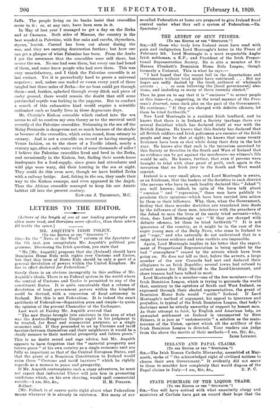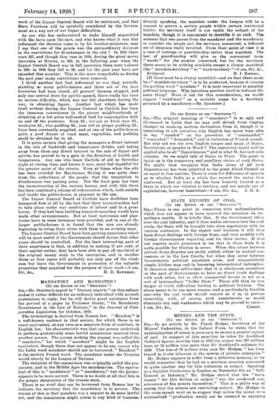STATE PURCHASE OF THE LIQUOR TRADE.
[To THE EDITOR or THE " SPECTATOR-"l
Sm.,—You will have noticed with what unanimity clergy and ministers of Carlisle have put on record their hope that the
work of the Liquor Control Board will be continued, and that State Purchase will be carefully considered by the Govern- ment as a way out of our liquor difficulties.
As one who has endeavoured to Make himself acquainted with the facts upon the spot, and who knows what it was that influenoed the decision come to by his brother-ministers, may I say that one of the points was the extraordinary decrease in the convictions for drunkenness in the city P In 1913 there were 237, and though they rose in 1916, during the great navvy incursion at Gretna, to 953, in the following year when the Liquor Control Board was in full operation these were reduced to 320; in 1918 they fell to 80, and for the past year have not exceeded that number. This is the more remarkable as during the past year many restrictions were removed.
I think another fact that influenced us was that, notwith- standing so many public-houses and three out of the four breweries had been closed, all grocers' licences stopped, and only one central store for spirits opened, there really has been no serious difficulty, which was not felt elsewhere during the war, in obtaining liquor. Another fact which has made itself evident during the Liquor Control in Carlisle has been the immense convenience in the poorer neighbourhoods of obtaining at a low price well-cooked food for consumption both on and off the premises. Soup 2d., hot-pot or Irish stew 2d., meat-pies 3d., rice pudding 3c1., jam roll or ginger pudding 2d.. have been constantly supplied, and at one of the public-houses quite a good dinner of roast meat, vegetables, and pudding could be obtained for ls. 4d.
It is quite certain that giving the managers a direct interest in the sale of foodstuffs and temperance drinks, and taking away from them any direct interest in the sale of liquor' and spirits, has proved to be a gain in the direction of health and temperance. Any one who knew Carlisle of old on Saturday night at closing time, and knows it now, must feel thankful for the greater quiet of the streets. Even at times when the city has been crowded for Martinmas Hiring it was quite clear from the orderliness of the people that the temptation to drunkenness was passing away. Not the least gain has been the reconstruction of the various houses, and with this there has been combined a scheme of redecoration which, both outside and inside the public-house, is pleasant to the eye.
The Liquor Control Board at Carlisle have doubtless been hampered first of all by the fact that their reconstruction had to take place under war conditions of labour and in a great hurry. If they had been building houses de novo they would have made other arrangements. But at least rest-rooms and play- rooms have in some instances been provided, and in one of the larger public-houses it is found that the men are already beginning to bring their wives with them to an evening meal.
The Liquor Control Board have been gaining experience which will be most useful if the Government should decree that other areas should be controlled. Not the least interesting part of their experience is that, in addition to making 17 per cent. of their capital outlay, they have been able to pay off one-third of the original money sunk in the enterprise, and in another three or four years will probably not only pay off the whole sum but leave the Government in possession of the valuable properties they acquired for the purpose of their work.—I am,



































 Previous page
Previous page